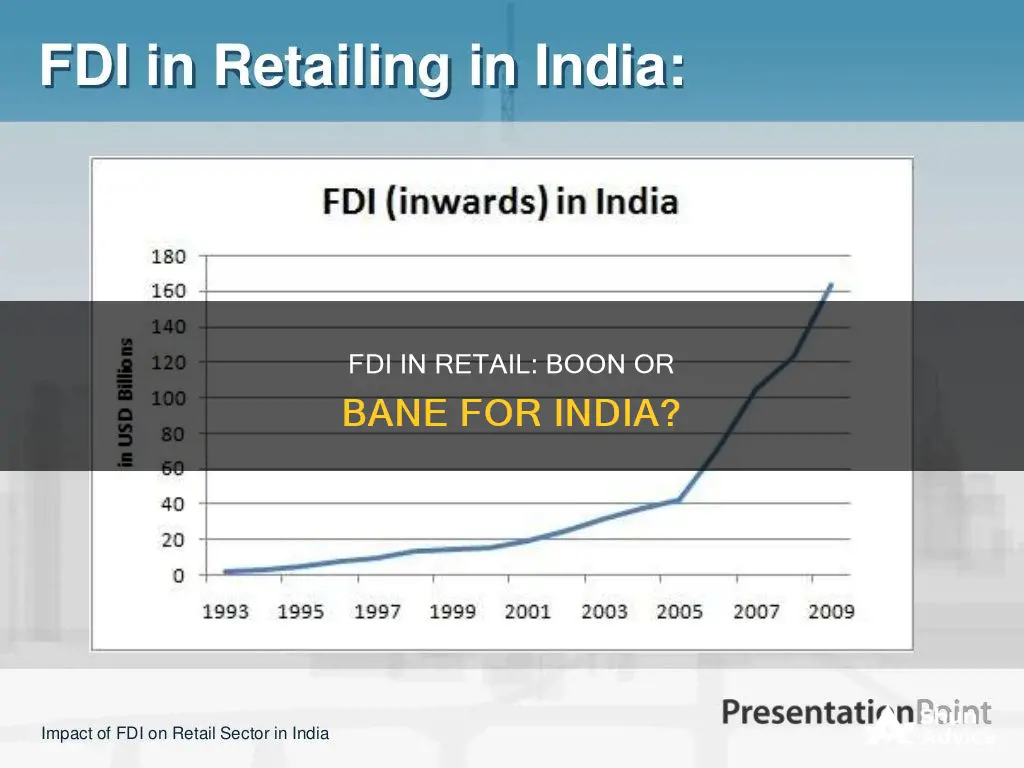
Foreign Direct Investment (FDI) in the retail sector has been a contentious issue in India. The government has progressively liberalised the sector, with the last major move being the allowance of 100% FDI in single-brand retail in 2012. The Indian retail market is worth approximately USD 600 billion and is one of the top five retail markets worldwide by economic value. It is also one of the fastest-growing markets, with a surging population of over a billion people. The sector contributes about 10% of India's Gross Domestic Product (GDP), with the unorganised sector dominating at 91%.
FDI in the retail sector has both advantages and disadvantages. Supporters argue that it will bring significant benefits, including economic growth, employment generation, benefits to farmers, improved infrastructure, and better technology and management practices. On the other hand, opponents fear that FDI may harm small businesses, drain the country's revenue to foreign nations, and negatively impact domestic retailers and the overall economy.
| Characteristics | Values |
|---|---|
| Effect on the economy | Positive: FDI can help the economy grow, bring in new infrastructure, and generate employment. |
| Negative: FDI may drain the country's revenue to foreign investors, which can harm the nation's economy. | |
| Effect on employment | Positive: FDI can create a lot of jobs in the organised retail sector. |
| Negative: FDI may lead to massive job losses, especially in the unorganised sector. | |
| Effect on farmers | Positive: FDI can benefit farmers by procuring produce directly from them, cutting down on intermediaries, and improving their margins. |
| Negative: Farmers may benefit initially, but later be at the mercy of bigger retailers once they get a strong share of the market. | |
| Effect on small businesses | Positive: FDI can induce competition in the market, benefiting small businesses. |
| Negative: Small businesses may not be able to withstand the competition from MNCs and may be wiped out from the market. | |
| Effect on consumers | Positive: FDI can lead to lower prices, better quality, and more variety for consumers. |
| Negative: MNCs may initially lower prices to gain a foothold in the market but later cause a price rise. |
What You'll Learn
- FDI in retail will lead to growth in the economy, with new infrastructure and more jobs
- FDI will be beneficial to farmers as it will cut down on intermediaries and improve their margins
- FDI will bring in better technology, management practices, and more learning for Indian players
- FDI will induce competition in the market, benefiting both consumers and producers
- FDI may lead to a loss of revenue for the country, with profits going to foreign companies

FDI in retail will lead to growth in the economy, with new infrastructure and more jobs
Foreign Direct Investment (FDI) in the retail sector is a highly debated topic in India. The Indian government has allowed 100% FDI in single-brand retail and 51% in multi-brand retail. This decision has sparked discussions about the potential benefits and drawbacks for the country's economy. Here are some arguments in favour of FDI in retail, highlighting how it will lead to economic growth, new infrastructure, and job creation.
Economic Growth and Infrastructure Development:
FDI in retail will stimulate India's economic growth by attracting significant foreign investment. As foreign companies enter the market, they will construct new infrastructure, benefiting sectors such as real estate and banking. Additionally, these companies will pay substantial taxes to the Indian government, which can be utilised for further infrastructure development. This will have a positive impact on the overall economy, creating a ripple effect of growth across various industries.
Job Creation and Employment Generation:
FDI in the retail sector is expected to create numerous job opportunities, particularly in the organised retail sector. This will address the issue of unemployment in India. Moreover, the entry of foreign companies will also create indirect job opportunities in associated industries, such as supply chain management, logistics, and transportation.
Benefits to Farmers and Producers:
FDI in retail will be advantageous for farmers and producers. Foreign companies will procure produce directly from them, reducing the number of intermediaries. This will result in better margins for farmers and a more efficient supply chain. Additionally, foreign companies can invest in supply chain infrastructure and adequate storage facilities, reducing the significant wastage currently seen in the unorganised sector, which is estimated to be around 40% for vegetables and fruits.
Foreign companies bring with them advanced technology, management expertise, and best practices. This knowledge transfer will benefit Indian companies and help improve their operations. The adoption of new technologies and modern management practices will lead to increased productivity and efficiency in the retail sector, positively impacting the overall economy.
Inducing Competition and Benefiting Consumers:
FDI in retail will induce competition in the market, which will ultimately benefit both consumers and producers. Consumers will have access to a wider variety of products, including international brands, at lower prices. The presence of foreign companies will also push domestic retailers to enhance their offerings, creating a more dynamic and competitive market environment.
Creating a Personal Investment Portfolio: A Simple Guide
You may want to see also

FDI will be beneficial to farmers as it will cut down on intermediaries and improve their margins
Foreign direct investment (FDI) in the retail sector has been a contentious issue in India. The government has been progressively liberalising the retail sector in India for foreign direct investment. The last major move came in 2012 when 100% FDI was allowed in single-brand retail. The Indian retail market is said to be worth USD 600 billion and is one of the fastest-growing markets with a surging population of more than a billion people. The retail market is expected to grow tremendously, with total consumption expenditure estimated to reach about USD 3600 billion by 2020.
FDI in the retail sector will be beneficial to farmers as it will cut down on intermediaries and improve their margins. The unorganised retail sector in India, which forms the bulk of the retail industry, is composed of local Kirana stores, owner-managed single general stores, beedi/pan shops, convenience stores, hawkers, and pavement vendors. This sector suffers from high levels of wastage, running up to 40% in the case of vegetables and fruits. With FDI in the retail sector, big retail chains can reduce this wastage by investing in supply chains and adequate storage facilities.
FDI in the retail sector will also benefit farmers by procuring produce from them directly. Farmers will get a better price for their produce as they will be cutting out the middlemen. This will improve the margins for farmers. Additionally, foreign companies can bring better technology, management best practices, and more learning for Indian players, which can benefit the agricultural sector.
However, there are also concerns that FDI in the retail sector may negatively impact small retailers and farmers in the long run. There is a risk that farmers, who may benefit initially, may also be at the mercy of bigger retailers once they gain a strong share of the market. The predatory pricing policies of large retailers can harm small and medium players in the sector.
Setting Up Your Virtual Investment Portfolio: A Step-by-Step Guide
You may want to see also

FDI will bring in better technology, management practices, and more learning for Indian players
Foreign direct investment (FDI) in the retail sector is a highly debated topic in India. FDI in the retail sector can bring in better technology, management practices, and more learning for Indian players.
FDI in the retail sector can bring in better technology, management practices, and more learning for Indian players in the following ways:
- Foreign companies can bring in new and improved technology, which can help modernize the Indian retail sector. This can lead to increased efficiency and productivity, particularly in the agriculture and food production sectors.
- FDI can facilitate the transfer of knowledge, skills, and expertise to Indian businesses and employees. This can result in improved management practices and operational efficiencies, benefiting both consumers and producers.
- With the inflow of FDI, India can gain access to international best practices in retail management, including marketing, supply chain management, and customer service. This can help Indian retailers enhance their operations and remain competitive in the market.
- FDI can also promote innovation and the adoption of new technologies in the Indian retail sector. This can drive the development of new products and services, benefiting consumers and creating new business opportunities.
- Additionally, FDI can provide Indian retailers with access to global networks and markets, allowing them to expand their reach and serve a wider customer base.
While FDI in the retail sector has the potential to bring these benefits, it is important to carefully consider the potential drawbacks and implement policies to mitigate any negative impacts on domestic businesses and the economy as a whole.
Investing vs. Saving: What's the Real Difference?
You may want to see also

FDI will induce competition in the market, benefiting both consumers and producers
Foreign direct investment (FDI) in the retail sector is a highly debated topic in India. FDI can induce competition in the market, benefiting both consumers and producers. Here are some ways in which FDI can stimulate competition:
- Increased Competition, Better Prices, and Variety: FDI in the retail sector will lead to more competition in the market. This increased competition will benefit consumers by providing them with a wider range of products and services at competitive prices. It will also encourage domestic companies to improve their product offerings and pricing to remain competitive.
- Enhanced Quality and Efficiency: The entry of foreign companies will raise the bar for quality and efficiency in the retail sector. Domestic companies will be compelled to adopt new technologies, management practices, and supply chain improvements to stay competitive. This will result in better products and services for consumers.
- Benefits for Producers: FDI in retail can also benefit producers, especially farmers. Foreign companies often procure produce directly from farmers, cutting out intermediaries and improving farmers' margins. Additionally, FDI can help reduce wastage in the agricultural sector by investing in supply chains and adequate storage facilities.
- Employment Opportunities: FDI in the retail sector has the potential to generate numerous employment opportunities in India. It will create jobs not only for educated individuals but also for those in the agricultural and unorganised sectors.
- Infrastructure Development: Foreign companies investing in India tend to develop new infrastructure, benefiting sectors like real estate and banking. This development will also positively impact the overall economy and contribute to economic growth.
While FDI in the retail sector has the potential to induce competition and bring about numerous benefits, it is essential to carefully consider its potential drawbacks. Some concerns related to FDI in retail include the displacement of small businesses, adverse effects on domestic companies, and the potential for foreign companies to form cartels and manipulate prices. Therefore, a balanced approach is necessary to maximise the benefits of FDI while mitigating its potential negative consequences.
Options Trading: A Personal Investment Portfolio Strategy?
You may want to see also

FDI may lead to a loss of revenue for the country, with profits going to foreign companies
Foreign Direct Investment (FDI) in the retail sector in India has been a contentious issue. Opponents of FDI in the retail sector argue that it may lead to a loss of revenue for the country, with profits going to foreign companies. Here are some ways in which this could occur:
- Displacement of Domestic Retailers: The entry of large multinational corporations (MNCs) into the Indian market may lead to the displacement of small domestic retailers, who may not be able to withstand the competition. This could result in a loss of revenue for the country as these domestic retailers contribute to economic growth and provide employment.
- Predatory Pricing and Market Control: While MNCs may initially offer lower prices to attract consumers, once they gain a strong foothold in the market, they may engage in predatory pricing and form cartels, leading to increased prices and reduced competition. This could result in higher profits for foreign companies at the expense of Indian consumers.
- Adverse Impact on Farmers: Farmers may benefit initially from direct procurement by large retailers, but as these retailers gain market power, they could drive down prices paid to farmers, negatively impacting their income.
- Job Losses: While FDI in the retail sector is expected to create new jobs, it could also lead to massive job losses in the unorganized retail sector, which currently absorbs about 7% of India's labour force.
- Profit Repatriation: Foreign companies may repatriate their profits back to their home countries, resulting in a net outflow of capital from India. This could lead to a loss of revenue for the country as these profits would not be reinvested in the Indian economy.
- Loss of Control: Allowing too much foreign control over the retail sector could lead to a loss of autonomy for India in making decisions that affect its economy and consumers.
Valuation Insights: Strategies for Management Decisions
You may want to see also
Frequently asked questions
Foreign Direct Investment (FDI) is an investment made by a company or an individual in one country into business interests located in another country. FDI is a major source of non-debt financial resources for the economic development of a country.
FDI in the retail sector in India can have the following advantages:
- It can boost the economy by bringing in new infrastructure, growth in sectors like real estate and banking, and tax revenue for the government.
- It can create more jobs in the organised retail sector.
- Farmers can benefit from direct procurement, reducing intermediaries and improving margins.
- It can help reduce wastage in the unorganised sector by investing in supply chains and storage facilities.
- It can bring in better technology, management practices, and expertise for Indian companies.
- It can increase competition in the market, benefiting both consumers and producers.
FDI in the retail sector in India can also have certain disadvantages:
- It may lead to a drain of revenue to foreign countries, harming the domestic economy.
- Domestic retail players may struggle to compete with MNCs and may be forced out of the market.
- MNCs may initially lower prices to gain market share and then form cartels to increase prices.
- Farmers, who may benefit initially, may eventually be at the mercy of these larger retailers.
- The pricing policies of big retailers can harm small and medium players in the sector.







